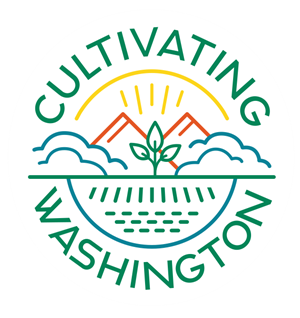In 1885, Alvinza Gardner Tillinghast opens his Puget Sound Seed Gardens on the Padilla Flats in Skagit County north of LaConner. Already experienced in growing cabbage seed, Tillinghast operates the business and the Padilla Bay Post Office out of his white two-story house. He grows seed on reclaimed land near Indian Slough and sells to local farmers. When the seed catalogue business closes in 1992, it is the oldest such firm in the Pacific Northwest, with customers all over the country. In 2004, Tillinghast Seed Company will be remodeled, but will still sell plants and flowers as it has for nearly 120 years.
Cabbage is King
A.G. Tillinghast started experimenting with cabbage seed in as early as 1873 on the Padilla Flats he had cleared and diked with his cousins R. E. Whitney and E. A. Sisson. In 1877, they dissolved the partnership and Tillinghast left the area for a few years. In 1883 he returned and started his seed business at Padilla, with cabbage seed his main crop. In 1885 he was selling seed to local farmers at his house.
In 1886, he created his first seed catalogue and called his company the Puget Sound Seed Garden. "To all who use garden and flower seeds," it declared, then listed seeds for five cents per papers. "Papers" were two by two-and-a-half inch waxed paper envelopes that held seed. Cauliflower seed cost 25 cents, Nest Egg gourd 15 cents, and tobacco 10 cents (Bellingham Herald).
From Padilla Flats to LaConner
In 1890, Tillinghast and his wife moved their business to LaConner. Their store and outlying buildings were right at the entrance to the little town. Their fields spread east toward Pleasant Ridge. It was a successful move. As the business grew, their seeds were sold all over the country.
The 1914 catalogue reveals all sorts of herb seed such as lavender, marjoram, and anise, as well as Pencil Pad black beans, Imp Golden wax beans, Earliana and Bonny Best tomato, California poppy, and snapdragon seeds. Sometime in the 1920s the name was changed to Tillinghast Seed Company. By then, the company bought seeds from local seed growers and repackaged them while maintaining its own extensive seed gardens.
In 1928, the year before the Great Depression began, the company produced its first full color catalogue, only to go back to mono colors the next year. According to current owner Arberta Lammers, "Color catalogues did not appear again until after World War II."
Today, the seed catalogue business is gone, but flowers and plants are sold in the original building. At the end of March 2004 the business will move into a newly remodeled building. The name Tillinghast Seed Company will continue an important part of the area's history.

